人教版(2019) 选择性必修二 Unit 2 Bridging Cultures Reading and Thinking课件(共35张PPT)
文档属性
| 名称 | 人教版(2019) 选择性必修二 Unit 2 Bridging Cultures Reading and Thinking课件(共35张PPT) | 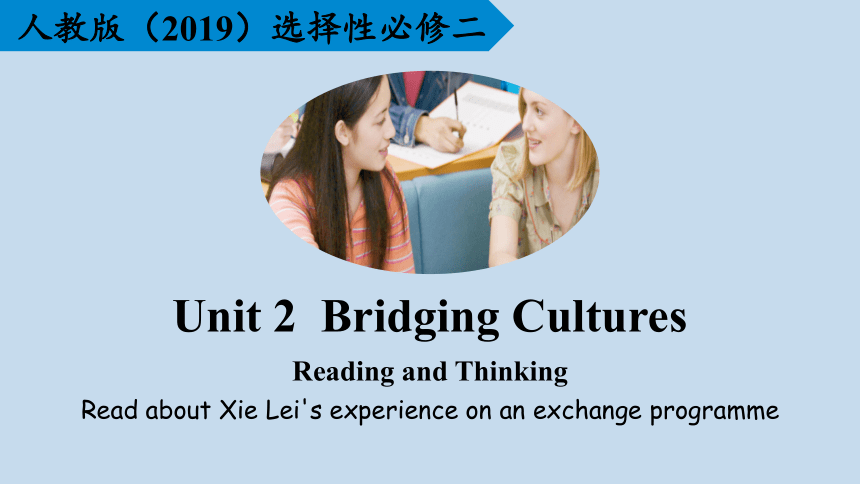 | |
| 格式 | pptx | ||
| 文件大小 | 10.9MB | ||
| 资源类型 | 教案 | ||
| 版本资源 | 人教版(2019) | ||
| 科目 | 英语 | ||
| 更新时间 | 2023-08-17 13:23:21 | ||
图片预览

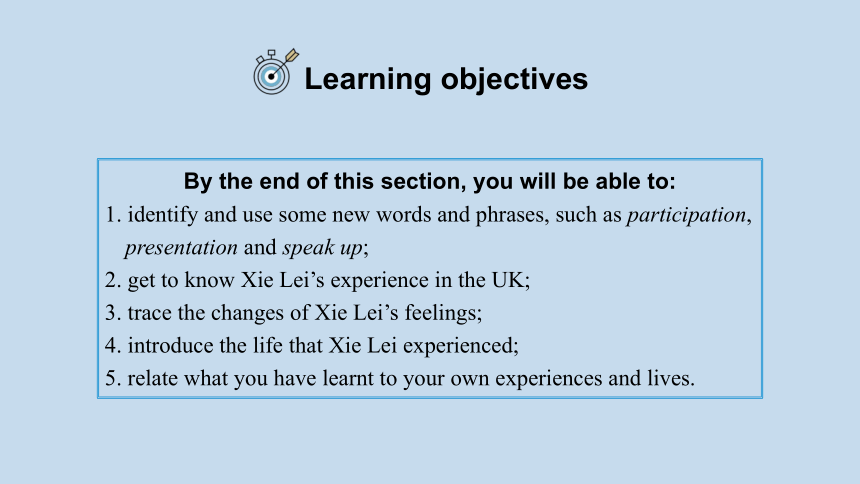

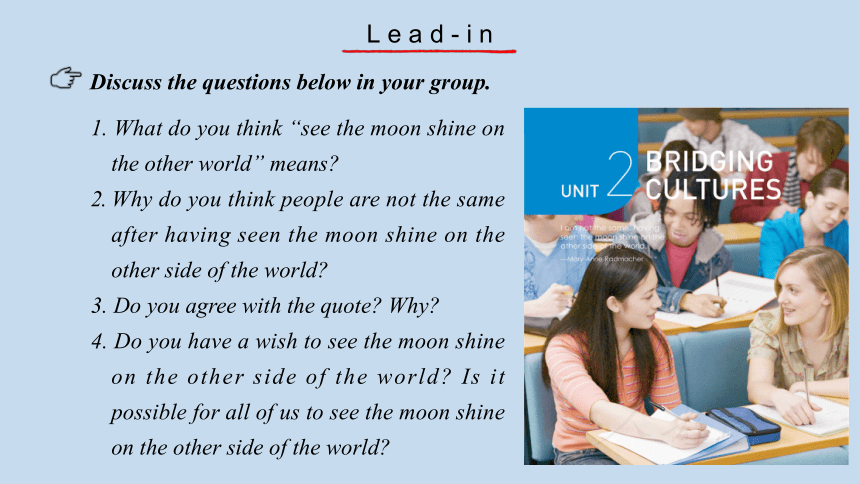
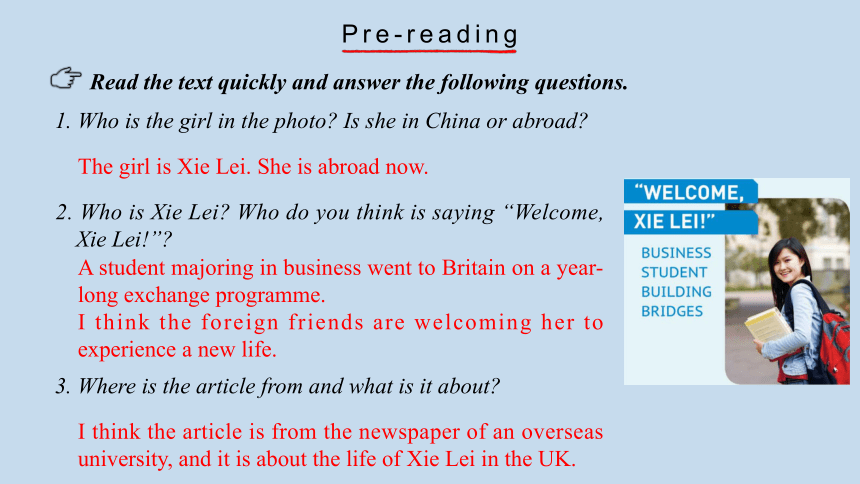
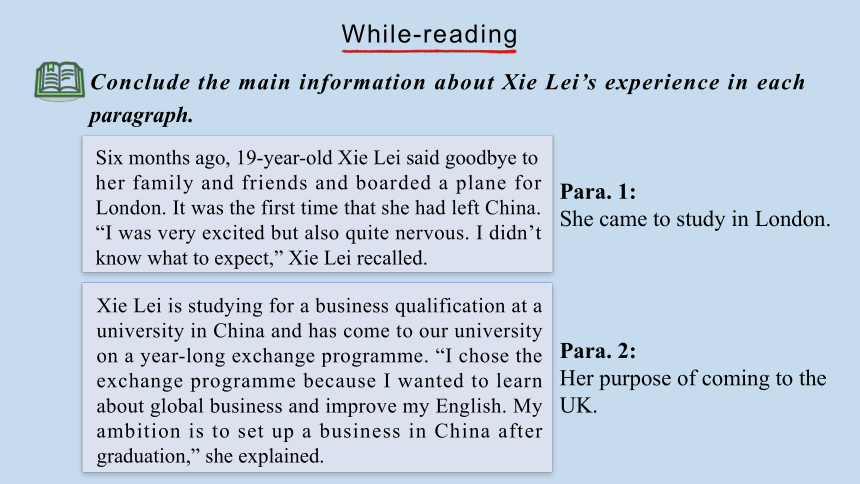
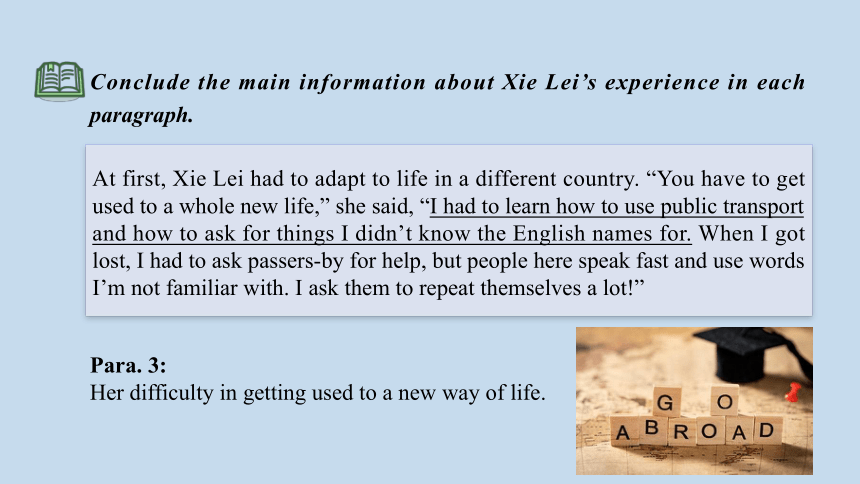
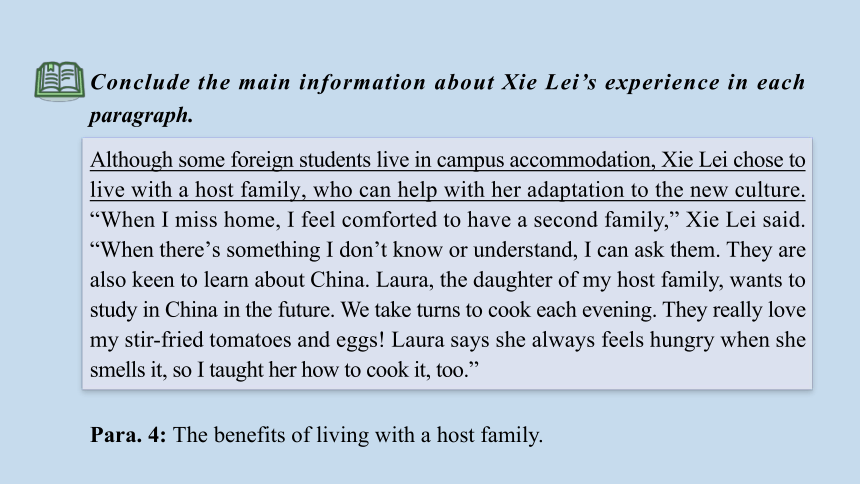
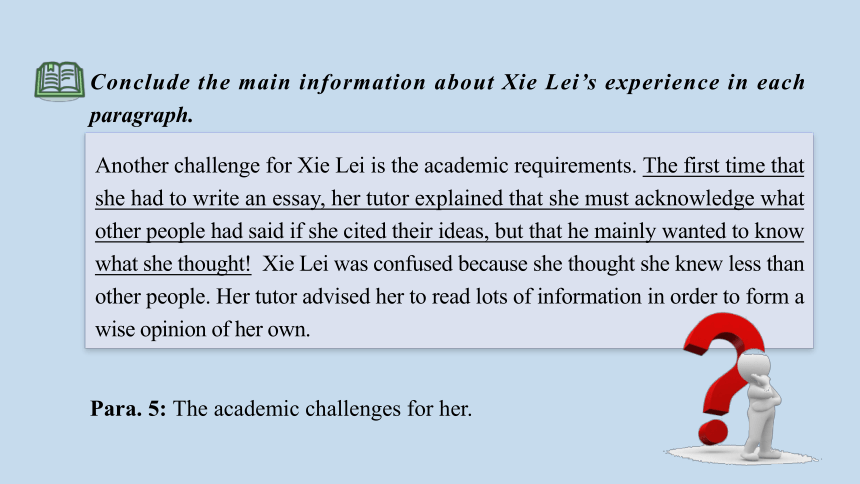
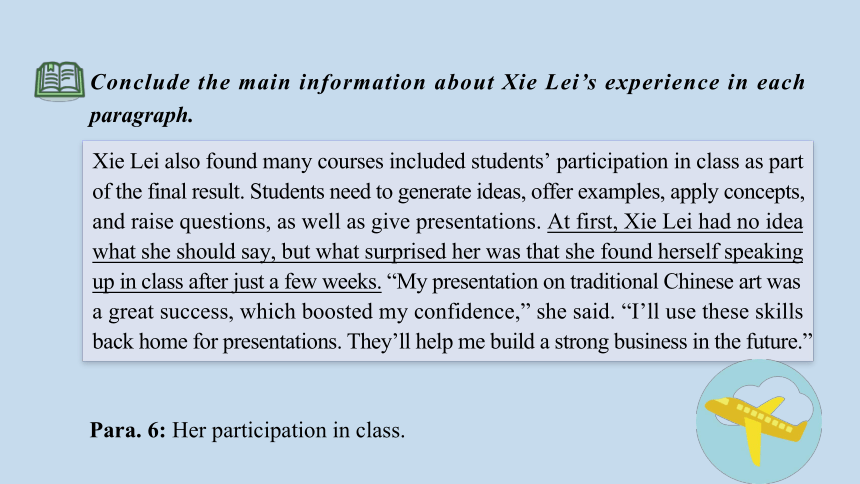
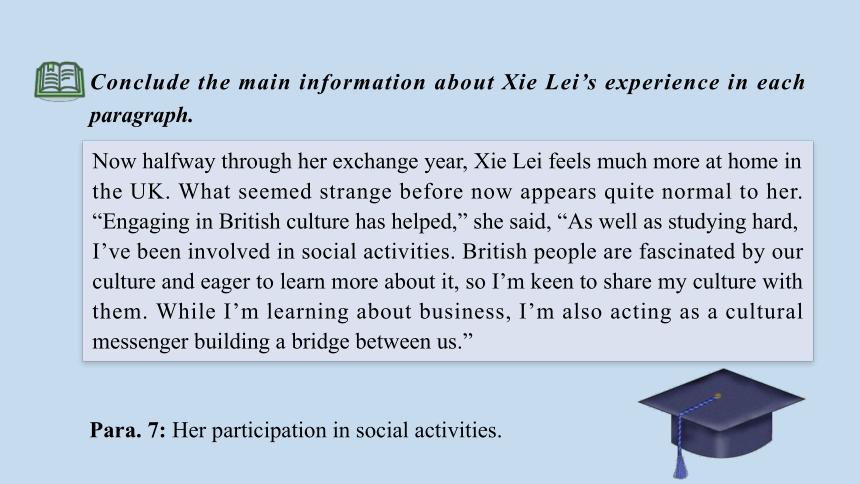
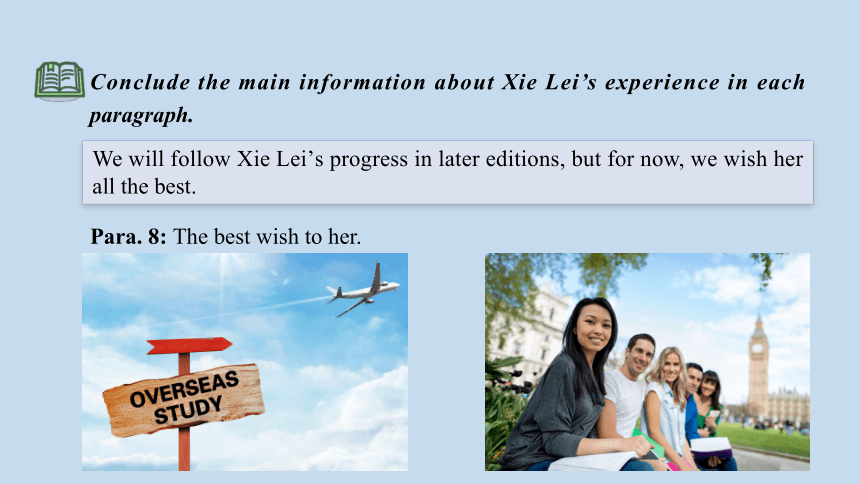
文档简介
(共35张PPT)
人教版(2019)选择性必修二
Unit 2 Bridging Cultures
Reading and Thinking
Read about Xie Lei's experience on an exchange programme
Learning objectives
By the end of this section, you will be able to:
1. identify and use some new words and phrases, such as participation, presentation and speak up;
2. get to know Xie Lei’s experience in the UK;
3. trace the changes of Xie Lei’s feelings;
4. introduce the life that Xie Lei experienced;
5. relate what you have learnt to your own experiences and lives.
I am not the same, having seen the moon shine on the other side of the world.
—Mary Anne Radmacher
在世界的另一端看过月光闪耀,我就不会是同样的自己了。
——玛丽·安妮·拉马赫
这句话用简单的语言阐述了一个人在接触另一种全新的文化后的心理触动,以及自己在深入体验这一文化后产生的深刻变化。这便是文化沟通与交流对个人的意义。
Lead-in
Discuss the questions below in your group.
1. What do you think “see the moon shine on the other world” means
2. Why do you think people are not the same after having seen the moon shine on the other side of the world
3. Do you agree with the quote Why
4. Do you have a wish to see the moon shine on the other side of the world Is it possible for all of us to see the moon shine on the other side of the world
Pre-reading
1. Who is the girl in the photo Is she in China or abroad
2. Who is Xie Lei Who do you think is saying “Welcome, Xie Lei!”
3. Where is the article from and what is it about
The girl is Xie Lei. She is abroad now.
A student majoring in business went to Britain on a year-long exchange programme.
I think the foreign friends are welcoming her to experience a new life.
I think the article is from the newspaper of an overseas university, and it is about the life of Xie Lei in the UK.
Read the text quickly and answer the following questions.
Conclude the main information about Xie Lei’s experience in each paragraph.
Xie Lei is studying for a business qualification at a university in China and has come to our university on a year-long exchange programme. “I chose the exchange programme because I wanted to learn about global business and improve my English. My ambition is to set up a business in China after graduation,” she explained.
Six months ago, 19-year-old Xie Lei said goodbye to her family and friends and boarded a plane for London. It was the first time that she had left China. “I was very excited but also quite nervous. I didn’t know what to expect,” Xie Lei recalled.
Para. 1:
She came to study in London.
Para. 2:
Her purpose of coming to the UK.
While-reading
Conclude the main information about Xie Lei’s experience in each paragraph.
Para. 3:
Her difficulty in getting used to a new way of life.
At first, Xie Lei had to adapt to life in a different country. “You have to get used to a whole new life,” she said, “I had to learn how to use public transport and how to ask for things I didn’t know the English names for. When I got lost, I had to ask passers-by for help, but people here speak fast and use words I’m not familiar with. I ask them to repeat themselves a lot!”
Conclude the main information about Xie Lei’s experience in each paragraph.
Although some foreign students live in campus accommodation, Xie Lei chose to live with a host family, who can help with her adaptation to the new culture. “When I miss home, I feel comforted to have a second family,” Xie Lei said. “When there’s something I don’t know or understand, I can ask them. They are also keen to learn about China. Laura, the daughter of my host family, wants to study in China in the future. We take turns to cook each evening. They really love my stir-fried tomatoes and eggs! Laura says she always feels hungry when she smells it, so I taught her how to cook it, too.”
Para. 4: The benefits of living with a host family.
Conclude the main information about Xie Lei’s experience in each paragraph.
Another challenge for Xie Lei is the academic requirements. The first time that she had to write an essay, her tutor explained that she must acknowledge what other people had said if she cited their ideas, but that he mainly wanted to know what she thought! Xie Lei was confused because she thought she knew less than other people. Her tutor advised her to read lots of information in order to form a wise opinion of her own.
Para. 5: The academic challenges for her.
Conclude the main information about Xie Lei’s experience in each paragraph.
Para. 6: Her participation in class.
Xie Lei also found many courses included students’ participation in class as part of the final result. Students need to generate ideas, offer examples, apply concepts, and raise questions, as well as give presentations. At first, Xie Lei had no idea what she should say, but what surprised her was that she found herself speaking up in class after just a few weeks. “My presentation on traditional Chinese art was a great success, which boosted my confidence,” she said. “I’ll use these skills back home for presentations. They’ll help me build a strong business in the future.”
Conclude the main information about Xie Lei’s experience in each paragraph.
Para. 7: Her participation in social activities.
Now halfway through her exchange year, Xie Lei feels much more at home in the UK. What seemed strange before now appears quite normal to her. “Engaging in British culture has helped,” she said, “As well as studying hard, I’ve been involved in social activities. British people are fascinated by our culture and eager to learn more about it, so I’m keen to share my culture with them. While I’m learning about business, I’m also acting as a cultural messenger building a bridge between us.”
Conclude the main information about Xie Lei’s experience in each paragraph.
Para. 8: The best wish to her.
We will follow Xie Lei’s progress in later editions, but for now, we wish her all the best.
Use a few sentences to summarize Xie Lei’s experience in the UK.
The article is about how a Chinese girl, Xie Lei, manages to adapt to a new life in the UK and meet the academic requirements as an exchange student. Apart from that, the article also talks about how Xie Lei acts as a cultural messenger building a bridge between China and the UK.
Suggested Answer
Read the article and work with a partner to analyse the structures in the underlined sentences. Use the tip for help.
Understand long sentences
English structures are different from those in Chinese, but you can figure out what a long sentence means by following a few simple steps.
1. Decide if the sentence is compound (look for and, but, or, etc.) or complex (look for who, when, where, etc.).
2. Find the main clause if it is a complex sentence.
3. Look for modifiers.
Read the article and work with a partner to analyse the structures in the underlined sentences. Use the tip for help.
I had to learn how to use public transport and how to ask for things I didn’t know the English names for. (Para. 3)
A complex sentence with an attributive clause (I didn’t ... for).
Although some foreign students live in campus accommodation, Xie Lei chose to live with a host family, who can help with her adaptation to the new culture. (Para. 4)
A complex sentence with an adverbial clause (Although ... accommodation) and an attributive clause (who ... culture).
(
)
[
]
(
)
Read the article and work with a partner to analyse the structures in the underlined sentences. Use the tip for help.
The first time that she had to write an essay, her tutor explained that she must acknowledge what other people had said if she cited their ideas, but that he mainly wanted to know what she thought! (Para. 5)
A complex sentence with an attributive clause (that she had to ... essay) and two object clauses combined with but (that she must ... ideas, that he mainly ... thought). The first object clause includes an adverbial clause (if ... ideas) and an object clause (what other people had said). The second object clause includes another object clause (what she thought).
(
)
[
]
Read the article and work with a partner to analyse the structures in the underlined sentences. Use the tip for help.
At first, Xie Lei had no idea what she should say, but what surprised her was that she found herself speaking up in class after just a few weeks. (Para. 6)
A compound-complex sentence with two sentences (At first ... say, what surprised ... weeks) combined with but. The first sentence includes an appositive clause (what ... say), and the second sentence includes a subject clause (what surprised her) and a predicative clause (that she found ... weeks).
(
)
(
)
(
)
Why did Xie Lei have the following feelings during her year studying abroad Make sentences using “Xie Lei felt/feels ... because ...” according to the article.
excited nervous comforted confused surprised confident feel at home
Xie Lei felt excited because it was the first time that she had left China.
Xie Lei felt nervous because she didn’t know what to expect.
Xie Lei felt comforted because she lived with a host family.
Xie Lei felt confused because she did not know how to form her own opinions based on other people’s ideas.
Why did Xie Lei have the following feelings during her year studying abroad Make sentences using “Xie Lei felt/feels ... because ...” according to the article.
excited nervous comforted confused surprised confident feel at home
Xie Lei felt surprised because she found herself speaking up in class after just a few weeks.
Xie Lei felt confident because her presentation on traditional Chinese art was a great success.
Xie Lei feels much more at home in the UK because what seemed strange before now appears quite normal to her.
Take notes on what you read in the article by filling in the table.
Challenges What Xie Lei did
Daily life adaptation to a whole new life learnt to ______________________;
learnt to ______________________
_____________________________;
asked for _____________________
_____________________________
loneliness lived with _____________________
Academic requirements writing an essay got help from __________________;
__________________ a lot to prepare
participating in __________ and giving ___________ gave presentation on _____________
______________________________
class
presentations
use public transport
ask for things she didn’t
know the English names for
help from passers-by when
she got lost
a host family
her tutor
read
traditional
Chinese art
Discuss the following questions in groups.
Post-reading
1. Why did Xie Lei choose the exchange programme
2. Why has Xie Lei got involved in social activities
3. How has Xie Lei helped to build bridges between China and the UK
She chose the exchange programme because she wanted to learn about global business and improve her English. Her ambition was to set up a business in China after graduation.
Because it can help her adapt to the new culture there. She’s also keen to share her culture with the British people.
As well as studying in the UK, she acts as a cultural messenger sharing Chinese culture with people around her by giving a presentation on traditional Chinese art, teaching people how to cook Chinese food, and involving herself in social activities.
Discuss the following questions in groups.
4. What other challenges do you think students studying abroad might face How can students prepare to handle these challenges before going abroad
One big challenge that many students have is the language — they may think they are good at English, but they are not used to hearing English being spoken at a normal speed, they are not used to English being spoken with a heavy accent, and they are not familiar with many English idioms.
The best way to prepare is to try to immerse themselves in English before they go abroad. They should watch a variety of English-language films and TV programmes without using subtitles, listen to English songs, and use every opportunity to speak with native English speakers.
Discuss the following questions in groups.
Another challenge may be coming to terms with the differences in a culture that is different to their own. Locals, however, will generally be understanding that the student is new to the country, and will appreciate attempts to learn and understand more about their culture. That is why it is best to be kind, respectful, and enthusiastic to try new things when in a foreign country — locals will be more willing to help new students and will be patient.
It can also be scary to try to fit into the new lifestyle while there, since it is so different to their own. Maybe students will face times when they don’t understand the proper way to do something, such as paying utility bills. In this case, there is always someone who is willing to help — either at your university campus or even in a local shop.
Words and Expressions
Xie Lei is studying for a business qualification at a university in China ... (P14)
谢蕾在中国一所大学攻读商科……
qualification / kw l f ke n/ n. (通过考试或学习课程取得的)资格;学历
搭配 acquire/gain/obtain qualifications 获得资格
have (no) qualifications for (doing) sth. = have (no) qualifications to do sth.
(没)有做某事的资格
例句
Finally, he gained a qualification. 最终,他获得了资格。
He has qualifications for teaching English. = He has qualifications to teach English.
他有教英语的资格。
A victory in this game will earn them a qualification for the World Cup.
这场比赛的胜利将使他们取得世界杯的参赛资格。
1
Xie Lei is studying for a business qualification at a university in China ... (P14)
谢蕾在中国一所大学攻读商科……
qualification / kw l f ke n/ n. (通过考试或学习课程取得的)资格;学历
拓展 qualify vt. & vi. (使)具备资格;(使)合格
qualify as ... 取得……资格 qualify sb. for ... 使某人能胜任……
qualify sb. to do ... 使某人有资格做……
qualified adj. 具备……资历;符合资格 be qualified to do sth. 有资格做某事
例句
He qualified as a doctor last year. 他去年取得了当一名医生的资格。
Neither his training nor his experience qualified him for his job as a railway engineer.
他所受的训练和他的经验都不能使他胜任铁路工程师的工作。
Having read the job advertisement, he wondered whether he was qualified to apply for it.读了这个招聘广告,他想知道他是否有资格来申请这份工作。
1
My ambition is to set up a business in China after graduation ... (P14)
我的志向是毕业后在中国创办一家企业……
ambition / m b n/ n. 追求的目标;夙愿;野心;抱负
搭配 achieve/realize one’s ambition 实现某人的理想
an ambition to do sth./of doing sth. 想做某事的愿望
例句
He had finally realized his ambition to become/of becoming a famous writer.
他最终实现了自己的夙愿,成了著名的作家。
Ambition never dies until there is no way out. [谚]不到黄河心不死。
拓展 ambitious adj. 有野心的;有雄心的
be ambitious for ... 渴望获得…… be ambitious to do sth. 渴望做某事
例句
They were very ambitious for their children. 他们望子成龙心切。
2
..., Xie Lei chose to live with a host family, who can help with her adaptation to the
new culture. (P14)
……,谢蕾选择住在寄宿家庭——有助于她适应异国文化。
adaptation / d p te n/ n. 适应;改编本
搭配 adaptation to 对……适应
例句
She made adaptation to the environment here, which made her parents delighted.
她适应了这里的环境,这让她的父母高兴。
This musical play was based on an adaptation of a famous book.
这部音乐剧是根据一本著名的书作改编而成的。
拓展 adapt vi. & vt. 适应(新情况) vt. 改编;改写
adapt to 适应…… adapt oneself to ... 使……适应……
adaptable adj. 能适应的,有适应能力的
3
Xie Lei also found many courses included students’ participation in class as part of
the final result. (P15)
此外,谢蕾发现很多课程的最终成绩都包含学生的课堂参与。
participation /pɑ t s pe n/ n. 参加;参与
例句
We want more participation in the decision-making. 我们想更多地参与决策。
A leg injury is preventing him from participation in the competition.
腿部受伤使他不能参加比赛。
拓展
participate vi. 参加;参与 participate in ... 参与…… participant n. 参与者
例句
Last spring, I was lucky enough to be chosen to participate in a cultural exchange program.
去年春天我非常幸运,被选中参加了一个文化交流项目。
4
Students need to generate ideas, offer examples, apply concepts, and raise questions,
as well as give presentations. (P15)
学生需要形成观点、提供例子、运用概念、提出问题,并且还要进行展示。
presentation / prezn te n/ n. 报告;陈述;出示;拿出
搭配 give a presentation / presentations 做报告/进行陈述
例句
The speaker gave an interesting presentation on urban transport.
演讲者就城市交通进行了有趣的陈述。
The presentation of prizes began after the speeches. 讲话结束后就开始颁奖了。
拓展 present vt. 授予,颁发,赠送;提交;阐述
present sth. to sb./sth. 向某人提交某物;把某物授予/颁给/赠给某人/某物
例句
The principal presented a diploma to each of the graduates.
校长把毕业证书颁发给每一位毕业生。
5
..., but what surprised her was that she found herself speaking up in class after just a
few weeks. (P15)
……但令她惊喜的是,仅仅几周时间,她就能在课堂上大胆发言了。
speak up 大声点说;明确表态
例句
Please speak up — we can’t hear you at the back.
请你大声点说——我们在后面听不见。
If anyone has a better idea, please speak up.
谁如果有更好的主意,请大胆地说出来。
拓展
look up 查阅;向上看
take up 占据;开始从事
bring up 提出;养育
pick up 学会;捡起;拾起;接电话
6
Now halfway through her exchange year, Xie Lei feels much more at home in the
UK. (P15)
一年的交换生生涯现已过半,谢蕾感觉在英国过得轻松自如多了。
feel at home 舒服自在;不拘束
例句
The warm atmosphere makes the customers feel at home.
这种温馨的气氛让顾客宾至如归。
Though he seldom appeared on the stage, he felt at home this time.
尽管他很少在舞台上露面,这次(在台上)他感觉很自在。
拓展
make oneself at home 别客气;随便
例句
Please sit down and make yourself at home. 请坐,像在自己家一样。
7
“Engaging in British culture has helped,” she said. (P15)
“融入英国文化使我受益匪浅。”她说。
engage / n ɡe d / vi. 参加;参与(活动) vt. 吸引(注意力、兴趣)
搭配 engage in ... (使)从事;参与
engage sb. as .../to do sth. 聘请某人作为……/做某事
engage sb.’s interest/attention 吸引某人的兴趣/注意力
例句
Only 10% of American adults engage in (doing) regular exercise.
只有10%的美国成年人定期进行锻炼。
I have engaged a secretary to deal with all my paperwork.
我雇用了一名秘书来处理我全部的文书工作。
If a book doesn’t engage my interest in the first few pages, I won’t read it.
如果一本书的前几页不能引起我的兴趣,我就不会再读它了。
拓展 engaged adj. 忙于,从事于;已订婚 engagement n. 订婚;约会,预约
8
As well as studying hard, I’ve been involved in social activities. (P15)
努力学习之余,我还参加了一些社交活动。
involve / n v lv/ vt. 包含;需要;涉及;影响;(使)参加
例句
We want to involve as many people as possible in the celebrations.
我们希望参加庆典的人越多越好。
The job involved me travelling all over the world.
那份工作需要我在世界各地来往。
拓展 involved adj. 参与,有关联 involvement n. 参与;投入
be/get involved in ... 参与……;与……有关
be involved with/in ... 专注于……
例句
Children can get a lot out of being involved in voluntary work.
孩子们通过参加志愿者工作会学到很多东西。
9
Write a summary about Xie Lei’s experience.
Think about what you could do if you face challenges abroad.
Homework
人教版(2019)选择性必修二
Unit 2 Bridging Cultures
Reading and Thinking
Read about Xie Lei's experience on an exchange programme
Learning objectives
By the end of this section, you will be able to:
1. identify and use some new words and phrases, such as participation, presentation and speak up;
2. get to know Xie Lei’s experience in the UK;
3. trace the changes of Xie Lei’s feelings;
4. introduce the life that Xie Lei experienced;
5. relate what you have learnt to your own experiences and lives.
I am not the same, having seen the moon shine on the other side of the world.
—Mary Anne Radmacher
在世界的另一端看过月光闪耀,我就不会是同样的自己了。
——玛丽·安妮·拉马赫
这句话用简单的语言阐述了一个人在接触另一种全新的文化后的心理触动,以及自己在深入体验这一文化后产生的深刻变化。这便是文化沟通与交流对个人的意义。
Lead-in
Discuss the questions below in your group.
1. What do you think “see the moon shine on the other world” means
2. Why do you think people are not the same after having seen the moon shine on the other side of the world
3. Do you agree with the quote Why
4. Do you have a wish to see the moon shine on the other side of the world Is it possible for all of us to see the moon shine on the other side of the world
Pre-reading
1. Who is the girl in the photo Is she in China or abroad
2. Who is Xie Lei Who do you think is saying “Welcome, Xie Lei!”
3. Where is the article from and what is it about
The girl is Xie Lei. She is abroad now.
A student majoring in business went to Britain on a year-long exchange programme.
I think the foreign friends are welcoming her to experience a new life.
I think the article is from the newspaper of an overseas university, and it is about the life of Xie Lei in the UK.
Read the text quickly and answer the following questions.
Conclude the main information about Xie Lei’s experience in each paragraph.
Xie Lei is studying for a business qualification at a university in China and has come to our university on a year-long exchange programme. “I chose the exchange programme because I wanted to learn about global business and improve my English. My ambition is to set up a business in China after graduation,” she explained.
Six months ago, 19-year-old Xie Lei said goodbye to her family and friends and boarded a plane for London. It was the first time that she had left China. “I was very excited but also quite nervous. I didn’t know what to expect,” Xie Lei recalled.
Para. 1:
She came to study in London.
Para. 2:
Her purpose of coming to the UK.
While-reading
Conclude the main information about Xie Lei’s experience in each paragraph.
Para. 3:
Her difficulty in getting used to a new way of life.
At first, Xie Lei had to adapt to life in a different country. “You have to get used to a whole new life,” she said, “I had to learn how to use public transport and how to ask for things I didn’t know the English names for. When I got lost, I had to ask passers-by for help, but people here speak fast and use words I’m not familiar with. I ask them to repeat themselves a lot!”
Conclude the main information about Xie Lei’s experience in each paragraph.
Although some foreign students live in campus accommodation, Xie Lei chose to live with a host family, who can help with her adaptation to the new culture. “When I miss home, I feel comforted to have a second family,” Xie Lei said. “When there’s something I don’t know or understand, I can ask them. They are also keen to learn about China. Laura, the daughter of my host family, wants to study in China in the future. We take turns to cook each evening. They really love my stir-fried tomatoes and eggs! Laura says she always feels hungry when she smells it, so I taught her how to cook it, too.”
Para. 4: The benefits of living with a host family.
Conclude the main information about Xie Lei’s experience in each paragraph.
Another challenge for Xie Lei is the academic requirements. The first time that she had to write an essay, her tutor explained that she must acknowledge what other people had said if she cited their ideas, but that he mainly wanted to know what she thought! Xie Lei was confused because she thought she knew less than other people. Her tutor advised her to read lots of information in order to form a wise opinion of her own.
Para. 5: The academic challenges for her.
Conclude the main information about Xie Lei’s experience in each paragraph.
Para. 6: Her participation in class.
Xie Lei also found many courses included students’ participation in class as part of the final result. Students need to generate ideas, offer examples, apply concepts, and raise questions, as well as give presentations. At first, Xie Lei had no idea what she should say, but what surprised her was that she found herself speaking up in class after just a few weeks. “My presentation on traditional Chinese art was a great success, which boosted my confidence,” she said. “I’ll use these skills back home for presentations. They’ll help me build a strong business in the future.”
Conclude the main information about Xie Lei’s experience in each paragraph.
Para. 7: Her participation in social activities.
Now halfway through her exchange year, Xie Lei feels much more at home in the UK. What seemed strange before now appears quite normal to her. “Engaging in British culture has helped,” she said, “As well as studying hard, I’ve been involved in social activities. British people are fascinated by our culture and eager to learn more about it, so I’m keen to share my culture with them. While I’m learning about business, I’m also acting as a cultural messenger building a bridge between us.”
Conclude the main information about Xie Lei’s experience in each paragraph.
Para. 8: The best wish to her.
We will follow Xie Lei’s progress in later editions, but for now, we wish her all the best.
Use a few sentences to summarize Xie Lei’s experience in the UK.
The article is about how a Chinese girl, Xie Lei, manages to adapt to a new life in the UK and meet the academic requirements as an exchange student. Apart from that, the article also talks about how Xie Lei acts as a cultural messenger building a bridge between China and the UK.
Suggested Answer
Read the article and work with a partner to analyse the structures in the underlined sentences. Use the tip for help.
Understand long sentences
English structures are different from those in Chinese, but you can figure out what a long sentence means by following a few simple steps.
1. Decide if the sentence is compound (look for and, but, or, etc.) or complex (look for who, when, where, etc.).
2. Find the main clause if it is a complex sentence.
3. Look for modifiers.
Read the article and work with a partner to analyse the structures in the underlined sentences. Use the tip for help.
I had to learn how to use public transport and how to ask for things I didn’t know the English names for. (Para. 3)
A complex sentence with an attributive clause (I didn’t ... for).
Although some foreign students live in campus accommodation, Xie Lei chose to live with a host family, who can help with her adaptation to the new culture. (Para. 4)
A complex sentence with an adverbial clause (Although ... accommodation) and an attributive clause (who ... culture).
(
)
[
]
(
)
Read the article and work with a partner to analyse the structures in the underlined sentences. Use the tip for help.
The first time that she had to write an essay, her tutor explained that she must acknowledge what other people had said if she cited their ideas, but that he mainly wanted to know what she thought! (Para. 5)
A complex sentence with an attributive clause (that she had to ... essay) and two object clauses combined with but (that she must ... ideas, that he mainly ... thought). The first object clause includes an adverbial clause (if ... ideas) and an object clause (what other people had said). The second object clause includes another object clause (what she thought).
(
)
[
]
Read the article and work with a partner to analyse the structures in the underlined sentences. Use the tip for help.
At first, Xie Lei had no idea what she should say, but what surprised her was that she found herself speaking up in class after just a few weeks. (Para. 6)
A compound-complex sentence with two sentences (At first ... say, what surprised ... weeks) combined with but. The first sentence includes an appositive clause (what ... say), and the second sentence includes a subject clause (what surprised her) and a predicative clause (that she found ... weeks).
(
)
(
)
(
)
Why did Xie Lei have the following feelings during her year studying abroad Make sentences using “Xie Lei felt/feels ... because ...” according to the article.
excited nervous comforted confused surprised confident feel at home
Xie Lei felt excited because it was the first time that she had left China.
Xie Lei felt nervous because she didn’t know what to expect.
Xie Lei felt comforted because she lived with a host family.
Xie Lei felt confused because she did not know how to form her own opinions based on other people’s ideas.
Why did Xie Lei have the following feelings during her year studying abroad Make sentences using “Xie Lei felt/feels ... because ...” according to the article.
excited nervous comforted confused surprised confident feel at home
Xie Lei felt surprised because she found herself speaking up in class after just a few weeks.
Xie Lei felt confident because her presentation on traditional Chinese art was a great success.
Xie Lei feels much more at home in the UK because what seemed strange before now appears quite normal to her.
Take notes on what you read in the article by filling in the table.
Challenges What Xie Lei did
Daily life adaptation to a whole new life learnt to ______________________;
learnt to ______________________
_____________________________;
asked for _____________________
_____________________________
loneliness lived with _____________________
Academic requirements writing an essay got help from __________________;
__________________ a lot to prepare
participating in __________ and giving ___________ gave presentation on _____________
______________________________
class
presentations
use public transport
ask for things she didn’t
know the English names for
help from passers-by when
she got lost
a host family
her tutor
read
traditional
Chinese art
Discuss the following questions in groups.
Post-reading
1. Why did Xie Lei choose the exchange programme
2. Why has Xie Lei got involved in social activities
3. How has Xie Lei helped to build bridges between China and the UK
She chose the exchange programme because she wanted to learn about global business and improve her English. Her ambition was to set up a business in China after graduation.
Because it can help her adapt to the new culture there. She’s also keen to share her culture with the British people.
As well as studying in the UK, she acts as a cultural messenger sharing Chinese culture with people around her by giving a presentation on traditional Chinese art, teaching people how to cook Chinese food, and involving herself in social activities.
Discuss the following questions in groups.
4. What other challenges do you think students studying abroad might face How can students prepare to handle these challenges before going abroad
One big challenge that many students have is the language — they may think they are good at English, but they are not used to hearing English being spoken at a normal speed, they are not used to English being spoken with a heavy accent, and they are not familiar with many English idioms.
The best way to prepare is to try to immerse themselves in English before they go abroad. They should watch a variety of English-language films and TV programmes without using subtitles, listen to English songs, and use every opportunity to speak with native English speakers.
Discuss the following questions in groups.
Another challenge may be coming to terms with the differences in a culture that is different to their own. Locals, however, will generally be understanding that the student is new to the country, and will appreciate attempts to learn and understand more about their culture. That is why it is best to be kind, respectful, and enthusiastic to try new things when in a foreign country — locals will be more willing to help new students and will be patient.
It can also be scary to try to fit into the new lifestyle while there, since it is so different to their own. Maybe students will face times when they don’t understand the proper way to do something, such as paying utility bills. In this case, there is always someone who is willing to help — either at your university campus or even in a local shop.
Words and Expressions
Xie Lei is studying for a business qualification at a university in China ... (P14)
谢蕾在中国一所大学攻读商科……
qualification / kw l f ke n/ n. (通过考试或学习课程取得的)资格;学历
搭配 acquire/gain/obtain qualifications 获得资格
have (no) qualifications for (doing) sth. = have (no) qualifications to do sth.
(没)有做某事的资格
例句
Finally, he gained a qualification. 最终,他获得了资格。
He has qualifications for teaching English. = He has qualifications to teach English.
他有教英语的资格。
A victory in this game will earn them a qualification for the World Cup.
这场比赛的胜利将使他们取得世界杯的参赛资格。
1
Xie Lei is studying for a business qualification at a university in China ... (P14)
谢蕾在中国一所大学攻读商科……
qualification / kw l f ke n/ n. (通过考试或学习课程取得的)资格;学历
拓展 qualify vt. & vi. (使)具备资格;(使)合格
qualify as ... 取得……资格 qualify sb. for ... 使某人能胜任……
qualify sb. to do ... 使某人有资格做……
qualified adj. 具备……资历;符合资格 be qualified to do sth. 有资格做某事
例句
He qualified as a doctor last year. 他去年取得了当一名医生的资格。
Neither his training nor his experience qualified him for his job as a railway engineer.
他所受的训练和他的经验都不能使他胜任铁路工程师的工作。
Having read the job advertisement, he wondered whether he was qualified to apply for it.读了这个招聘广告,他想知道他是否有资格来申请这份工作。
1
My ambition is to set up a business in China after graduation ... (P14)
我的志向是毕业后在中国创办一家企业……
ambition / m b n/ n. 追求的目标;夙愿;野心;抱负
搭配 achieve/realize one’s ambition 实现某人的理想
an ambition to do sth./of doing sth. 想做某事的愿望
例句
He had finally realized his ambition to become/of becoming a famous writer.
他最终实现了自己的夙愿,成了著名的作家。
Ambition never dies until there is no way out. [谚]不到黄河心不死。
拓展 ambitious adj. 有野心的;有雄心的
be ambitious for ... 渴望获得…… be ambitious to do sth. 渴望做某事
例句
They were very ambitious for their children. 他们望子成龙心切。
2
..., Xie Lei chose to live with a host family, who can help with her adaptation to the
new culture. (P14)
……,谢蕾选择住在寄宿家庭——有助于她适应异国文化。
adaptation / d p te n/ n. 适应;改编本
搭配 adaptation to 对……适应
例句
She made adaptation to the environment here, which made her parents delighted.
她适应了这里的环境,这让她的父母高兴。
This musical play was based on an adaptation of a famous book.
这部音乐剧是根据一本著名的书作改编而成的。
拓展 adapt vi. & vt. 适应(新情况) vt. 改编;改写
adapt to 适应…… adapt oneself to ... 使……适应……
adaptable adj. 能适应的,有适应能力的
3
Xie Lei also found many courses included students’ participation in class as part of
the final result. (P15)
此外,谢蕾发现很多课程的最终成绩都包含学生的课堂参与。
participation /pɑ t s pe n/ n. 参加;参与
例句
We want more participation in the decision-making. 我们想更多地参与决策。
A leg injury is preventing him from participation in the competition.
腿部受伤使他不能参加比赛。
拓展
participate vi. 参加;参与 participate in ... 参与…… participant n. 参与者
例句
Last spring, I was lucky enough to be chosen to participate in a cultural exchange program.
去年春天我非常幸运,被选中参加了一个文化交流项目。
4
Students need to generate ideas, offer examples, apply concepts, and raise questions,
as well as give presentations. (P15)
学生需要形成观点、提供例子、运用概念、提出问题,并且还要进行展示。
presentation / prezn te n/ n. 报告;陈述;出示;拿出
搭配 give a presentation / presentations 做报告/进行陈述
例句
The speaker gave an interesting presentation on urban transport.
演讲者就城市交通进行了有趣的陈述。
The presentation of prizes began after the speeches. 讲话结束后就开始颁奖了。
拓展 present vt. 授予,颁发,赠送;提交;阐述
present sth. to sb./sth. 向某人提交某物;把某物授予/颁给/赠给某人/某物
例句
The principal presented a diploma to each of the graduates.
校长把毕业证书颁发给每一位毕业生。
5
..., but what surprised her was that she found herself speaking up in class after just a
few weeks. (P15)
……但令她惊喜的是,仅仅几周时间,她就能在课堂上大胆发言了。
speak up 大声点说;明确表态
例句
Please speak up — we can’t hear you at the back.
请你大声点说——我们在后面听不见。
If anyone has a better idea, please speak up.
谁如果有更好的主意,请大胆地说出来。
拓展
look up 查阅;向上看
take up 占据;开始从事
bring up 提出;养育
pick up 学会;捡起;拾起;接电话
6
Now halfway through her exchange year, Xie Lei feels much more at home in the
UK. (P15)
一年的交换生生涯现已过半,谢蕾感觉在英国过得轻松自如多了。
feel at home 舒服自在;不拘束
例句
The warm atmosphere makes the customers feel at home.
这种温馨的气氛让顾客宾至如归。
Though he seldom appeared on the stage, he felt at home this time.
尽管他很少在舞台上露面,这次(在台上)他感觉很自在。
拓展
make oneself at home 别客气;随便
例句
Please sit down and make yourself at home. 请坐,像在自己家一样。
7
“Engaging in British culture has helped,” she said. (P15)
“融入英国文化使我受益匪浅。”她说。
engage / n ɡe d / vi. 参加;参与(活动) vt. 吸引(注意力、兴趣)
搭配 engage in ... (使)从事;参与
engage sb. as .../to do sth. 聘请某人作为……/做某事
engage sb.’s interest/attention 吸引某人的兴趣/注意力
例句
Only 10% of American adults engage in (doing) regular exercise.
只有10%的美国成年人定期进行锻炼。
I have engaged a secretary to deal with all my paperwork.
我雇用了一名秘书来处理我全部的文书工作。
If a book doesn’t engage my interest in the first few pages, I won’t read it.
如果一本书的前几页不能引起我的兴趣,我就不会再读它了。
拓展 engaged adj. 忙于,从事于;已订婚 engagement n. 订婚;约会,预约
8
As well as studying hard, I’ve been involved in social activities. (P15)
努力学习之余,我还参加了一些社交活动。
involve / n v lv/ vt. 包含;需要;涉及;影响;(使)参加
例句
We want to involve as many people as possible in the celebrations.
我们希望参加庆典的人越多越好。
The job involved me travelling all over the world.
那份工作需要我在世界各地来往。
拓展 involved adj. 参与,有关联 involvement n. 参与;投入
be/get involved in ... 参与……;与……有关
be involved with/in ... 专注于……
例句
Children can get a lot out of being involved in voluntary work.
孩子们通过参加志愿者工作会学到很多东西。
9
Write a summary about Xie Lei’s experience.
Think about what you could do if you face challenges abroad.
Homework
